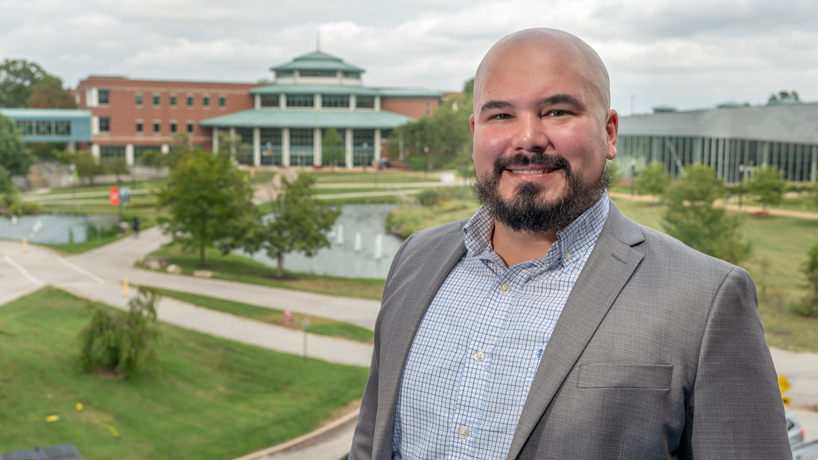
Barry Darnell is serving as the executive director of UMSL’s new Advanced Workforce Center. (Photo by Derik Holtmann)
The University of Missouri–St. Louis has been a leading driver of workforce development in the St. Louis region since its founding 60 years ago.
The majority of its more than 112,000 alumni remain in the region after graduation to live and work, and they fill jobs in every industry.
But the model for equipping employees with the skills they want and that businesses need has been shifting, and UMSL is adapting to that reality. The university’s new Advanced Workforce Center will provide accessible educational opportunities for all by delivering diverse pathways to degree attainment to meet workforce demands.
“Nontraditional is traditional,” said Reggie Hill, UMSL’s vice chancellor for strategic enrollment and career advancement. “We know that, give or take, 10% more students are choosing to go into the workforce than ever before, so the need for a tailored program has become more and more necessary. We’ve always provided workforce training, but typically, it took four years. Now students can learn and earn at the same time.”
The university is committed to working with business partners to identify and address their needs to attract, retain and nurture talented workers. The center will provide a customized corporate partnership model where employers invest in their employees through degree obtainment as well as through certifications and noncredit coursework.
BJC HealthCare and Compass Health have each faced an increased need for quality, trained social workers who can help manage cases and assess, diagnose and treat mental illness as well as substance use and addiction. Last year, the two providers signed agreements with UMSL that allow eligible employees to pursue Master of Social Work degrees through the university while receiving relevant academic support services to ensure student achievement and degree completion.
UMSL is working to finalize similar agreements with regional employers in other industries through the Advanced Workforce Center.
The university is also a strategic education partner with the Amazon Career Choice program, which provides employees benefits that include full college tuition, industry certifications designed to lead to in-demand jobs, and English language proficiency, high school diplomas and GEDs.
More recently, UMSL has partnered with AllCampus, a leading higher education services provider that partners with top-ranked institutions to make higher education more affordable, accessible and equitable. Under the agreement, AllCampus will add 48 online degree programs from UMSL to its workplace platform, providing access to UMSL degree programs to more than 20 million working professionals from over 4,000 organizations in AllCampus’ workplace network.
“It will help us scale nationally,” Hill said of the partnership. “UMSL is a top-tier regional public institution. We’re not only looking to have an impact in the region; we’re looking to build an advanced workforce initiative of consequence that can have an impact around the nation.”
UMSL has tapped Barry Darnell to lead those efforts going forward. He is serving as the executive director of the Advanced Workforce Center and began his new role on Sept. 5.
Darnell has spent the past 10 years in workforce development, including three years as a workforce development specialist and operations coordinator with the United Nurses and Allied Professionals Rhode Island Hospital Education Fund. For the past seven years, he worked at the Council for Adult and Experiential Learning, a national nonprofit membership organization that works to improve education-to-career pathways for adult learners.
“I really liked working at that intersection where folks are looking to grow their careers and to develop their skills after the traditional age where people often come to college,” Darnell said. “I’m passionate about really looking at how we develop appropriate pathways so that folks gain life, career and work skills that are really relevant. We want them to have programs that are affordable, accessible and flexible and are also having an impact on the local community. That’s really what stood out to me: the opportunity to do that kind of work at UMSL and in St. Louis.”
UMSL has long served adult learners through its Computer Education and Training Center in West County, but Darnell is charged with helping the center evolve beyond its current scope to offer more skilling, reskilling and noncredit courses beyond computer education. He believes that can bring significant value to the business community in St. Louis and far beyond.
“When we talk about the cost of recruitment, the cost of turnover, the cost of training internally versus outsourcing that to the university where the university is now the partner that’s providing these opportunities, we’re talking about something really exciting,” Darnell said. “The cost of tuition reimbursement is always going to be less than the cost of recruitment, of onboarding, of the time it takes to get people up to speed or of designing job descriptions, reorganizing teams and going through the selection process when there’s turnover.
“We want to be very strategic and create a real hub of learning to help make it so businesses don’t have to try to recruit from outside the metro area to fill in these more advanced positions because there are people in our community now who want to work at that level, who want to earn that money and want to do that job.”
Media Coverage
St. Louis Business Journal














